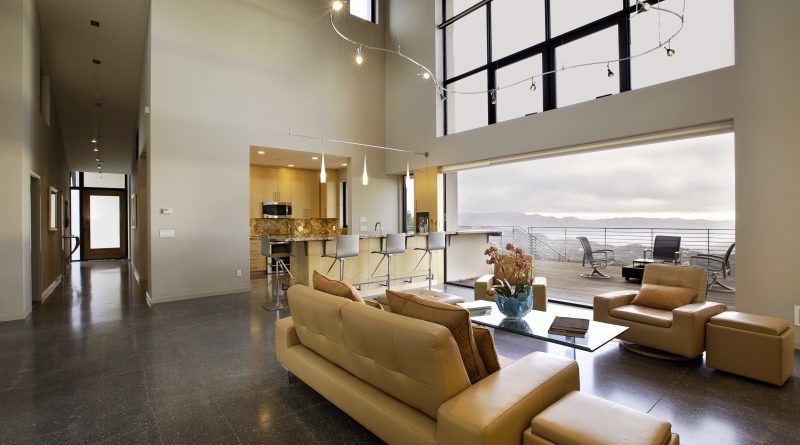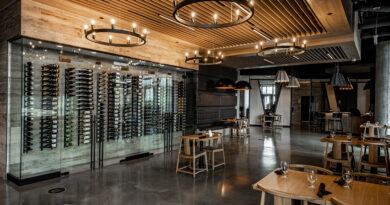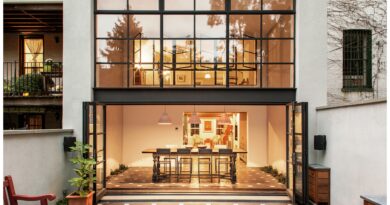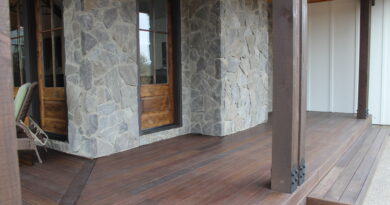Sonoma Hillside
Function & Aesthetics for Panoramic Dreamscape in Sonoma, California
by Ken Shallcross, vice president, Modern Architecture + Design Society
Set into an east-facing hillside overlooking the town of Sonoma, California, this custom house focuses on view, ventilation, and controlled solar access, while providing a contemporary lifestyle for a retired couple. Each design decision was made with attention paid to how the result affects function, aesthetics, and livability in the home.
The clients came to David Marlatt and his team at DNM Architecture, San Francisco, California, with three ideas in mind. They were looking to build their retirement home on a gorgeous lot with amazing East-facing views. They needed their home to be ready for aging, incredibly energy efficient, and aesthetically they wanted their home to be in harmony with the surrounding hillsides and integrated into the natural landscape.
To address the desire for high energy efficiency, the home was designed to consume near net-zero energy. The end result is a Green Point Certified House which employs premier structural insulated panels, insulated concrete forms, and other passive and active strategies, all of which contribute to a minimal need for air conditioning in the summer and heating in the winter. The home averaged a total daily energy use of 57KwH in the first ten months of occupancy, 33KwH of that was supplied by the home’s own solar energy.

In addition, the home utilizes a personal water storage system, including four 5,000-gallon, above-ground water storage tanks that are located on a hillside below the house. The harvested rainwater contributes to irrigation, reducing the use of city water, which is especially important in drought years.
To provide the clients with the aesthetically pleasing exterior they asked for, the home’s placement on the land and intentionally designed folded roof respect and recall the topography of the surrounding Sonoma County hills. Its shallow depth maximizes the panoramic views and cross-ventilation from afternoon ocean air. Marlatt and his team ran airflow simulation tests through the house during the design process, ensuring that no dead-air spaces would be built. The folded roof also maximizes the home’s ability to site solar panels, increasing the electric production to its fullest potential.
Finally, to address the aging-in-place requirement, the home is organized almost entirely on a single level, with only storage and open office space on the upper floor. Two 5’ square stacking closets are prepped for a future elevator, doors have lever handles and are sized at major spaces to accommodate a future wheelchair, and an attached dwelling unit can be converted into a future caregiver’s apartment.
As you enter the home, the pivoting front door brings visitors into the home’s entry hallway. This compressed space shows light at the end of the tunnel, pulling all who enter forward. The poured-in-place polished concrete flooring that runs throughout the home is not just a gorgeous design choice, it is also zero-maintenance and provides a thermal mass to help modulate temperature swings.

There are two rooms and a full bathroom at the front entrance, currently serving as a hobby room and an exercise/media room. One has a murphy bed already installed, but both could easily be transformed into bedrooms for extended family visits. The full bathroom gives the first look at a design choice repeated in each bathroom, which is a door in the shower that provides entry to the back patio/ pool deck for quick access after a swim or the ability to use a restroom without dripping water through the home.
Walking down the hall, visitors are pulled into the home’s great room, which combines living room, kitchen, and adjacent dining area. The ceiling here is two-stories tall and there is evidence of one of the main energy design strategies here. The home is only one room deep. Thus, the owners can open both sides of any room to get amazing cross ventilation. The Pacific Ocean lies about five miles to the West, and the afternoons bring cool ocean air from that flows right through the home. Because of this intuitive design, the air conditioner is rarely utilized, despite the sometimes-warm California climate. In fact, the home often produces more energy than it uses, even in the summer.
Western Window Systems are used throughout for the many sliding glass doors and windows. In the main living space, the large sliding doors that slide into a pocket provide an instant connection to the east-facing deck and the grand sweeping views of the surrounding California hills. Additional windows at the second-story height above the sliding doors allow immense natural light to pour into the space. On the other side of the room, a three-pane glass door slides and stacks to provide cross ventilation.
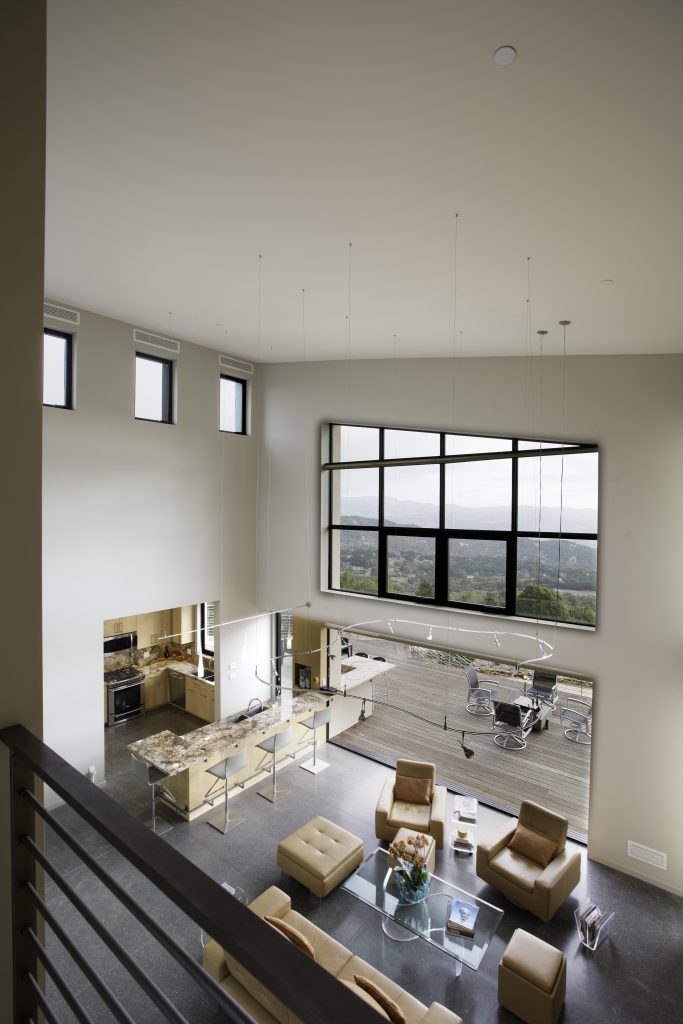
The kitchen is modest in its size, but grand in its functionality. The real standout design choice is the implementation of a front kitchen. While the main kitchen has all major appliances and plenty of counter space, a kitchen peninsula is pushed forward just a bit into the living space and holds a coffee bar, wine refrigerator, sink, and plenty of storage and counter space. Perfect for entertaining, this structure can also serve as a bar and service area while the host can stay connected to guests. The peninsula is separated from the kitchen by a small door that provides quick indoor/outdoor access for the chef/host. The peninsula’s countertop runs up to the sliding glass doors and continues through to form an outside bar. The glass door slides into a cutout made in the countertops, providing a seamless transition of indoor/outdoor entertaining space.
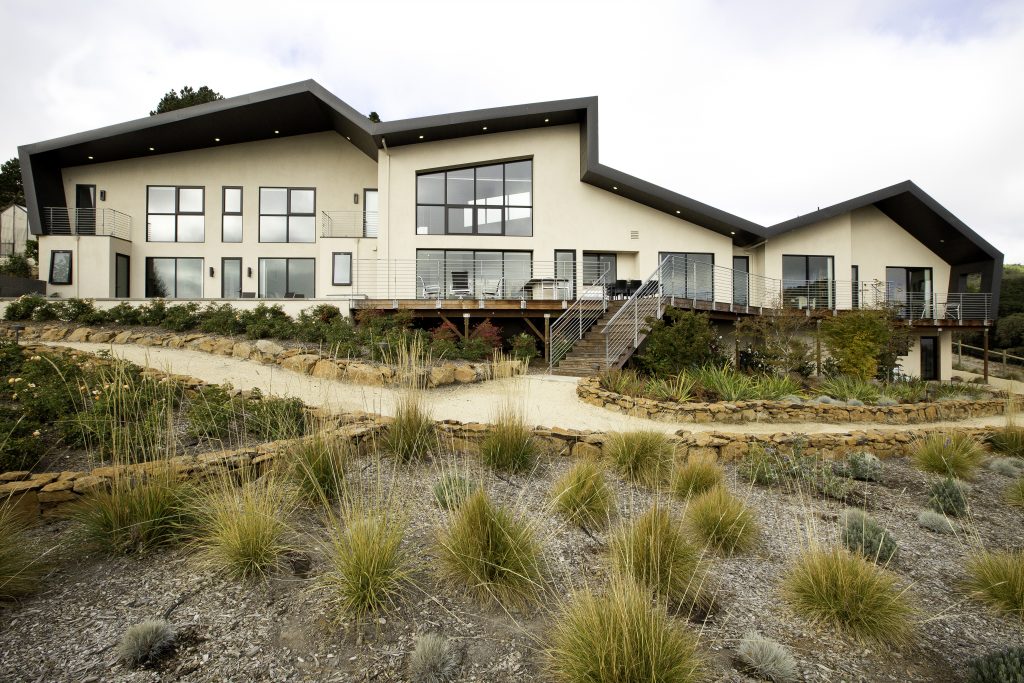
Moving out of the main living space, the home continues down a hallway into the private area of the home. Two bedrooms were designed as dual suites, though the bedroom at the end of the hall is slightly larger. Each room is connected to an office space above and a stairway to the upper floor, and the latter effectively divides the space in half and separates the two suites. The bedrooms have two-story ceilings and east-facing windows at the second-floor level to bring in the natural light. The awning windows above open to expel hot air in the summer months and allow the cooling winds to flow in at night.
The only stairs in the home lead up a secluded, straight hallway that is completely lit by two-story floor-to-ceiling windows. At the top, visitors can go in three directions, including: straight ahead through sliding glass doors to a small patio at the west side of the home, which, due to the topography, is just slightly above ground level; to the right into the first suite’s office area; or to the left into the master suite’s mezzanine and office balcony. Both office spaces have access to their own private second floor terrace on the east side of the home.
“Marlatt was a dream to work with. He really listened to our descriptions of what we wanted including a modern aesthetic. All in all, we’re very pleased with the home DNM Architecture designed for us,” said the owners of the home.
This stunning modern home in Sonoma is the end result of a wonderful collaboration between DNM Architecture and Deveau Construction, Windsor, California. This forever home celebrates contemporary design and ultra-green building techniques, while capitalizing on magnificent, panoramic views that make life on this sunny Sonoma hillside a never-ending dreamscape.
